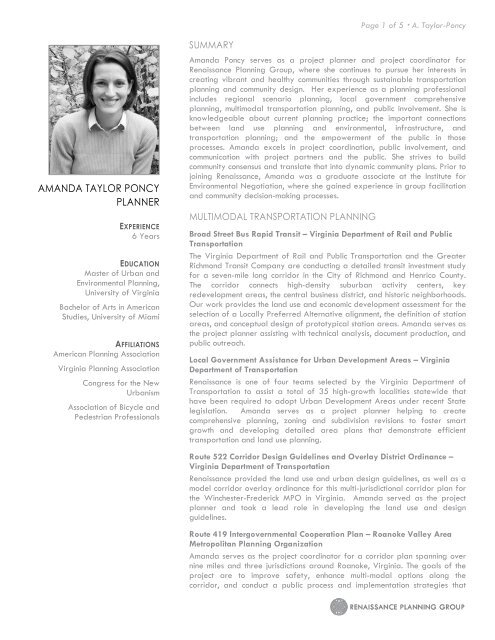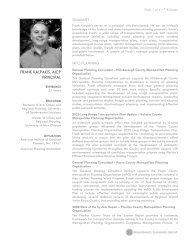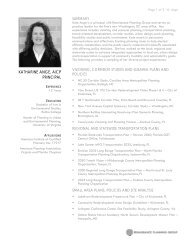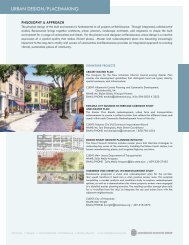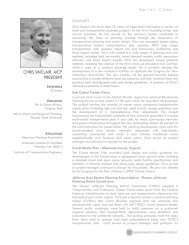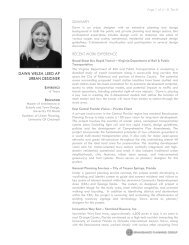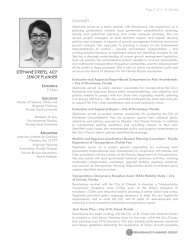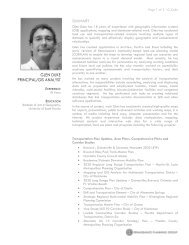AMANDA TAYLOR PONCY PLANNER - Renaissance Planning Group
AMANDA TAYLOR PONCY PLANNER - Renaissance Planning Group
AMANDA TAYLOR PONCY PLANNER - Renaissance Planning Group
Create successful ePaper yourself
Turn your PDF publications into a flip-book with our unique Google optimized e-Paper software.
<strong>AMANDA</strong> <strong>TAYLOR</strong> <strong>PONCY</strong><br />
<strong>PLANNER</strong><br />
EXPERIENCE<br />
6 Years<br />
EDUCATION<br />
Master of Urban and<br />
Environmental <strong>Planning</strong>,<br />
University of Virginia<br />
Bachelor of Arts in American<br />
Studies, University of Miami<br />
AFFILIATIONS<br />
American <strong>Planning</strong> Association<br />
Virginia <strong>Planning</strong> Association<br />
Congress for the New<br />
Urbanism<br />
Association of Bicycle and<br />
Pedestrian Professionals<br />
SUMMARY<br />
Page 1 of 5 � A. Taylor-Poncy<br />
Amanda Poncy serves as a project planner and project coordinator for<br />
<strong>Renaissance</strong> <strong>Planning</strong> <strong>Group</strong>, where she continues to pursue her interests in<br />
creating vibrant and healthy communities through sustainable transportation<br />
planning and community design. Her experience as a planning professional<br />
includes regional scenario planning, local government comprehensive<br />
planning, multimodal transportation planning, and public involvement. She is<br />
knowledgeable about current planning practice; the important connections<br />
between land use planning and environmental, infrastructure, and<br />
transportation planning; and the empowerment of the public in those<br />
processes. Amanda excels in project coordination, public involvement, and<br />
communication with project partners and the public. She strives to build<br />
community consensus and translate that into dynamic community plans. Prior to<br />
joining <strong>Renaissance</strong>, Amanda was a graduate associate at the Institute for<br />
Environmental Negotiation, where she gained experience in group facilitation<br />
and community decision-making processes.<br />
MULTIMODAL TRANSPORTATION PLANNING<br />
Broad Street Bus Rapid Transit – Virginia Department of Rail and Public<br />
Transportation<br />
The Virginia Department of Rail and Public Transportation and the Greater<br />
Richmond Transit Company are conducting a detailed transit investment study<br />
for a seven-mile long corridor in the City of Richmond and Henrico County.<br />
The corridor connects high-density suburban activity centers, key<br />
redevelopment areas, the central business district, and historic neighborhoods.<br />
Our work provides the land use and economic development assessment for the<br />
selection of a Locally Preferred Alternative alignment, the definition of station<br />
areas, and conceptual design of prototypical station areas. Amanda serves as<br />
the project planner assisting with technical analysis, document production, and<br />
public outreach.<br />
Local Government Assistance for Urban Development Areas – Virginia<br />
Department of Transportation<br />
<strong>Renaissance</strong> is one of four teams selected by the Virginia Department of<br />
Transportation to assist a total of 35 high-growth localities statewide that<br />
have been required to adopt Urban Development Areas under recent State<br />
legislation. Amanda serves as a project planner helping to create<br />
comprehensive planning, zoning and subdivision revisions to foster smart<br />
growth and developing detailed area plans that demonstrate efficient<br />
transportation and land use planning.<br />
Route 522 Corridor Design Guidelines and Overlay District Ordinance –<br />
Virginia Department of Transportation<br />
<strong>Renaissance</strong> provided the land use and urban design guidelines, as well as a<br />
model corridor overlay ordinance for this multi-jurisdictional corridor plan for<br />
the Winchester-Frederick MPO in Virginia. Amanda served as the project<br />
planner and took a lead role in developing the land use and design<br />
guidelines.<br />
Route 419 Intergovernmental Cooperation Plan – Roanoke Valley Area<br />
Metropolitan <strong>Planning</strong> Organization<br />
Amanda serves as the project coordinator for a corridor plan spanning over<br />
nine miles and three jurisdictions around Roanoke, Virginia. The goals of the<br />
project are to improve safety, enhance multi-modal options along the<br />
corridor, and conduct a public process and implementation strategies that
Page 2 of 5 � A. Taylor-Poncy<br />
establish cooperative inter-governmental agreements on corridor<br />
improvements for both the near and the long term.<br />
Multimodal <strong>Planning</strong> Program – Virginia Department of Transportation<br />
Funded by a newly established grant program, projects that fall under the<br />
purview of this contract include community-based studies that integrate transit,<br />
bicycle, pedestrian, and vehicular modes of transportation. The majority of<br />
these projects include consideration of land use and urban design as it relates<br />
to corridor and community character and encouragement of a multimodal<br />
environment. For the initial year of the grant program, Amanda managed<br />
and provided technical support for a corridor study in the Town of Orange<br />
(Routes 15 and 20) and a multimodal transportation plan in the Town of<br />
Dumfries. This included an analysis of existing multimodal infrastructure, plans,<br />
and policies, a policy audit and recommendations for improving development<br />
standards, and assisting with the community consensus building process.<br />
Richmond Road Multimodal Corridor Plan – Virginia Department of<br />
Multimodal <strong>Planning</strong><br />
For this regional corridor study, funded by the Virginia Department of<br />
Multimodal <strong>Planning</strong> Grant Program, Amanda served as project coordinator<br />
for a team of planners, engineers and designers to identify land use and<br />
transportation improvements appropriate to the distinct “context zones”<br />
along the Route 250 corridor between the historic small town of Staunton and<br />
rural Augusta County. The project involved a series of meetings with local<br />
landowners and developers as well as community workshops and technical<br />
analysis. It culminated in an integrated program of multimodal transportation<br />
projects and urban design regulations to shape future economic and<br />
community development initiatives.<br />
Village Transportation Links Plan – Montgomery County, Virginia<br />
This project focused on creating a bicycle, pedestrian and greenways plan<br />
that proposed recommendations outlining viable connections within villages,<br />
between villages, to neighboring towns and cities, and to the regional<br />
greenway network. Amanda served as the project coordinator and planner<br />
for the development of the Master Plan, which included considerable<br />
coordination with the public and project stakeholders. She performed data<br />
collection, research, analysis and writing of deliverables. She also utilized<br />
ArcGIS and Adobe Illustrator to create maps; prepared materials for team<br />
and stakeholder meetings; and assisted in making presentations.<br />
Multimodal Transportation District Implementation – City of Boca Raton,<br />
Florida<br />
The City of Boca Raton wants to identify the appropriate transportation<br />
concurrency strategy and boundaries for one or more districts within the City.<br />
Five multimodal transportation districts were proposed, each encompassing a<br />
major regional destination and surrounding residential communities. The<br />
subsequent multimodal quality of service analysis will focus on strategies for<br />
improving regional connections to the center of each district and improving<br />
local transit, street connectivity, walking, and biking within the districts. As<br />
project planner, Amanda assisted with the implementation tasks including<br />
revisions to the City’s Comprehensive Plan and Land Development Code.
COMPREHENSIVE AND MASTER PLANNING<br />
Page 3 of 5 � A. Taylor-Poncy<br />
Comprehensive Plan Update – Chesterfield County, Virginia<br />
This is the first comprehensive plan update in over 20 years for this suburban<br />
county of over 300,000 population. The planning process is unique in<br />
integrating land use, public facility, transportation and fiscal impact modeling<br />
in a coordinated data-driven policy framework. Amanda is serving as a<br />
project planner for the Update and is involved in researching and drafting<br />
issue papers and assisting with the public involvement process.<br />
Comprehensive Plan Update – Town of Cape Charles, Virginia<br />
This project was designed to update the land use and design components of<br />
the Comprehensive Plan for the Town of Cape Charles, Virginia. Amanda<br />
served as the Project Planner, assisting with the community consensus building<br />
process, creating a policy framework plan for development based on the<br />
input of the community and key stakeholders, and assisting with the updates to<br />
the Future Land Use section of the Comprehensive Plan.<br />
Comprehensive Plan Update – City of Winchester, Virginia<br />
Amanda is the project planner for an interdisciplinary team that is facilitating<br />
a series of community forums for a medium-sized Virginia city seeking to<br />
protect its historic character and enhance its economic development. Amanda<br />
assisted with the community consensus building process, which included public<br />
workshops throughout the ten City neighborhoods, that contributed to the<br />
development of alternative scenarios for each neighborhood as an update to<br />
the Comprehensive Plan.<br />
US Route 30 Master Plan – Smart Growth Partnership of Westmoreland<br />
County, Pennsylvania<br />
Amanda completed this major study for the non-profit regional Smart Growth<br />
Partnership of Westmoreland County. The scenario planning initiative resulted<br />
in a regional vision for the 40-mile stretch of the nation’s first highway,<br />
supported by 14 municipalities. As project coordinator and planner, Amanda<br />
assisted in public involvement and outreach efforts, facilitated community<br />
workshops, performed data collection, technical analysis, and writing of final<br />
deliverables, and conducted a week-long charrette that met National<br />
Charrette Institute standards. In addition to a vision and master plan for the<br />
corridor, the project included a demonstration site plan for an evolving<br />
suburban development area as well as an “implementation toolkit” for<br />
recommended strategies such as model ordinances, land banks, and urban<br />
revitalization programs.<br />
Land Use and Transportation Plan – Town of Morrisville, North Carolina<br />
Amanda was the project planner on a team that prepared an award-winning<br />
comprehensive Land Use Plan for this town in the heart of the Research<br />
Triangle that has experienced one of the highest rates of growth in the State.<br />
Specific work included participating in the public input process and preparing<br />
policies, implementation recommendations and development guidelines.<br />
East Central Florida Vision – Private Client<br />
<strong>Renaissance</strong>’s multi-office team is designing the open space, transportation<br />
and settlement pattern schematic plans for the Deseret Ranch project in<br />
Central Florida. Amanda has provided research assistance on historical<br />
precedents that will serve as a guide for future development on the ranch.
SUSTAINABILITY AND ENVIRONMENTAL PLANNING<br />
Page 4 of 5 � A. Taylor-Poncy<br />
“Building a Cleaner James River” Watershed Study – James River<br />
Association<br />
The James River is Virginia’s largest tributary to the Chesapeake Bay and<br />
home to the Jamestown settlement. The project required an environmental<br />
audit of the codes and ordinances of all localities in the James River<br />
watershed, and was part of the multi-jurisdictional watershed study for the<br />
James River Association. Amanda conducted the audit for the City of<br />
Charlottesville and Fluvanna County and coordinated a local government<br />
summit to share results and best practices.<br />
Fluvanna County Watershed Management Plan – Fluvanna County,<br />
Virginia<br />
Over half of Fluvanna County, Virginia is located within the Rivanna River<br />
watershed, a culturally and historically significant river. The project included a<br />
“rapid assessment” of stream conditions and produced a prioritized list of<br />
strategies taking into account fiscal and logistic realities. The project<br />
concluded with a final report and presentation to the Fluvanna County Board<br />
of Supervisors. Amanda was an integral member of the team that created the<br />
plan, assisting in the existing conditions assessment, biological and chemical<br />
monitoring, data collection, and strategy development as well as presenting<br />
the final plan to the Board of Supervisors.<br />
Rural Residential Development Study – James City County, Virginia<br />
Amanda assisted in a study to promote clustering and open space<br />
preservation in designated rural areas for this historic county surrounding<br />
Williamsburg, Virginia. Working with a steering committee and the public, the<br />
team created several scenarios to determine the environmental and fiscal<br />
implications of differing rural development patterns. Evaluation of the<br />
scenarios will lead to development of implementation tools, including a design<br />
manual and a new ordinance. Amanda assisted in the facilitation of<br />
community workshops and in the creation of the zoning ordinance.<br />
RESEARCH AND TRAINING<br />
“Complete Streets for Older Road Users” Research Report and Webinar –<br />
American Association of Retired Persons<br />
Amanda served as project coordinator for a research study designed to help<br />
transportation professionals and citizen advocates plan and design safe,<br />
“complete streets” for older road users. Amanda conducted research related<br />
to national trends, and coordinated the research, writing and writing sections<br />
related to roadway and intersection design. She served a facilitator for a<br />
roundtable of nationally recognized transportation planning and engineering<br />
experts to discuss proposed design recommendations, and she helped design<br />
a webinar delivered to AARP advocacy experts from across the country.<br />
Smart Transportation Toolkit – Montana Department of Transportation<br />
Amanda worked with a team of national and local experts to develop a<br />
web-based land use and transportation planning guide for Montana<br />
planners. During the initial phase of the project, she conducted research and<br />
analysis on a wide range of existing planning tools across the nation, and<br />
helped identify the tools most relevant to Montana. She then coordinated the<br />
development of a website featuring concise, readable and graphically<br />
appealing summaries of more than 50 tools and strategies addressing
Page 5 of 5 � A. Taylor-Poncy<br />
consensus-building, land use and transportation planning, local regulations,<br />
funding strategies, and technical analysis.<br />
PRESENTATIONS<br />
Panel Speaker: “The History of Tomorrow: <strong>Planning</strong> for the Future in a<br />
Historic Resort Town,” Virginia <strong>Planning</strong> Association Conference, Wintergreen,<br />
Virginia, 2007<br />
AWARDS<br />
2009 North Carolina Marvin Collins <strong>Planning</strong> Award, Outstanding <strong>Planning</strong><br />
Award, Comprehensive <strong>Planning</strong> (Small Community): Town of Morrisville<br />
2009 Land Use and Transportation Plans Update


